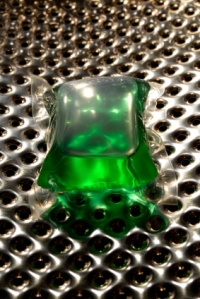With the summer now over and the dark nights drawing in, children are choosing to play indoors more frequently. And while children are a joy to be around, RoSPA hopes that parents are beginning to think about reducing the risks to their children in the home, particularly in the kitchen, where some of the most serious accidents occur.
The kitchen poses many hazards to our little ones and there are many things that parents can do to protect their children from injury. It is important, however, to stress that it is impossible to “childproof” the home – this is a dangerously misleading term implying that 100 per cent safety is achievable.

Small children can mistake liquitab style dishwasher and washing machine detergents for sweets and ingest them. We encourage families to keep chemical items such as laundry detergents and other products in a lockable cupboard.
Are liquitab detergents safe?
We have noticed a worrying new trend in injuries to children ingesting liquitab style dishwasher and washing machine detergents. If used correctly, these products are completely safe and very effective. Unfortunately, they are also very appealing to small children who can mistake them for sweets and ingest them.
We were recently alerted to cases in which children were admitted to hospital in Glasgow as a result of the ingestion of liquid detergent from capsules. In addition to children swallowing detergent, doctors have also previously raised awareness of the risk of injury to young children who get liquid detergent in their eyes. The safe storage of all household chemicals is absolutely crucial and we encourage families to keep chemical items such as laundry detergents and other products in a lockable cupboard.
How reliable are child-resistant caps on products?
Parents should never transfer dangerous products from one container to another. Although the law requires child-resistant closures on medicine bottles and other hazardous substances for domestic use, these are absolutely not childproof. The aim of such caps is to provide a little time in which parents may spot that a child is accessing a potential poison and intervene to prevent the substance being ingested. Unfortunately, the weakness of the cap is that some children are actually quite adept at opening them, often when asked by an older person struggling to find the necessary finger power and dexterity to open it themselves!
Be alert to the risk of scalds and burns!

Children should not be left unsupervised in the kitchen at any time, but the use of oven guards can assist in ensuring that the environment is safer for them when parents are cooking.
Burns to children’s hands from oven doors is also a very important issue in the kitchen. Whilst there are very strict controls in place limiting the surface temperatures of oven doors, they can still get very hot. Children’s skin is thinner than adult skin and as such they are more susceptible to injury here, especially as they are naturally inclined to explore their surroundings by touching what they see.
What many parents may not be aware of is that there are some very effective products on the marketplace that can be placed over oven doors to guard against these serious hazards. Children should not be left unsupervised in the kitchen at any time, but the use of oven guards can assist in ensuring that the environment is safer for them when parents are cooking.
Parents should arrange storage areas carefully so that heavy items are not kept on high shelves. Extra care should be taken with hot water, tea, coffee or soup to avoid the risk of young children at their feet getting scalded. Knives and scissors should be kept in good condition and out of reach of children, as should matches and lighters, and pan handles should be turned inward so that children cannot reach them and pull them over (cordless kettles or those with a coiled lead are recommended so that children cannot pull on them).
How safe is the glass in your home?
Finally, think about the glass in your interior doors and patio doors. Building regulations define “critical areas” where safety glazing is mandatory. Areas such as doors and low-level glazing where a child might accidentally fall against the glass always require safety glazing.
RoSPA is aware of many children being seriously injured by sliding on smooth kitchen floors into glass doors. In one incident, a child slid head-first through a patio door and narrowly avoided being decapitated as the glass broke into a large “guillotine” shaped shard. Ordinary glass is dangerous – particularly at low level – because it breaks into these large, jagged pieces which can cause serious injury.
If you do not have safety glass fitted in these areas then protective film can be used to protect smaller panes. Larger panes should be constructed from laminated or toughened glass which is stronger and if it does break, it will do so into smaller, less jagged pieces. RoSPA advises not letting children play near glass at all and to ensure that glazed areas of homes are well lit.
For further advice, visit www.rospa.com/homesafety.
Philip LeShirley, RoSPA’s product safety adviser